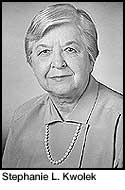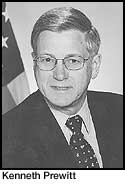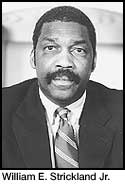|
|
||
|
|
|
Kwolek, Moore, Murray, Prewitt and Strickland to Receive Honorary Degrees
Stephanie L. Kwolek, Gordon E. Moore, John E. Murray Jr., Kenneth Prewitt and William E. Strickland Jr. will receive honorary degrees at Carnegie Mellonšs 104th commencement ceremony at 11 a.m., Sunday, May 20, in Gesling Stadium. The following is a brief look at each recipient.
Stephanie L. Kwolek
Through her work in the field of liquid crystalline polymers, Kwolek invented the technology for the foundation of the Kevlar® fiber. Kevlar®, five times stronger than steel (20 times stronger under water), is resistant to wear, corrosion, fatigue and flame, and is non-conductive.
Kevlar has more than 200 applications. It is used to manufacture protective clothing (including fire-safe suits for fire fighters and bulletproof vests for police officers), ropes and cables, plastic reinforcement, industrial fabrics and materials in the aircraft and aerospace field.
Kwolek's work for DuPont led to 16 United States patents. Her early research in low temperature processes made possible the preparation of unmeltable or thermally unstable polymers, which formed the groundwork for Lycra® spandex fiber, Nomex® and Kevlar® aramid fibers.
Since retiring in 1986, she has worked as a consultant in polymer chemistry and has completed a term on the Liquid Crystalline Polymer Committee of the National Research Council of the National Academy of Sciences.
Kwolek is active in mentoring other women scientists and participating in programs for school children. One of Kwolek's most cited papers, written with Paul W. Morgan, is "The Nylon Rope Trick," which describes how to demonstrate condensation polymerization in a beaker at atmospheric pressure and room temperature. This experiment is used in classrooms across America. She has authored or co-authored more than 30 publications.
Kwolek was the fourth woman inducted into the then 113-member National Inventors Hall of Fame in 1994. She was awarded the National Medal of Technology in 1996, the Society of Chemical Industry Perkin Medal in 1997 and was inducted into the Plastics Hall of Fame in 1997. She received a Carnegie Mellon Alumni Distinguished Achievement Award in 1998 and was elected a member of the National Academy of Engineering in 2001.
She is a member of the American Chemical Society, the American Institute of Chemists, the Sigma Xi and Phi Kappa Phi honorary societies and the Franklin Institute of Philadelphia.
Kwolek earned her bachelor's degree in chemistry from Carnegie Mellon in 1946. She has received honorary degrees from Worcester Polytechnic Institute and Clarkson University.
Gordon E. Moore
Moore co-founded Intel to develop and produce large scale integrated (LSI) products beginning with semiconductor memories. Since that time Intel has produced a number of products based upon LSI technology, including the world's first microprocessor.
Moore started his post-academic career in 1953 on the technical staff of the Applied Physics Laboratory at Johns Hopkins University, where he did research in chemical physics. He joined the Shockley Semiconductor Laboratory in Palo Alto, Calif., shortly after its founding in 1956, working on semiconductor process technology with William Shockley, co-inventor of the transistor.
In 1957, Moore co-founded the Fairchild Semiconductor Corporation in Mountain View, Calif., where he managed its Engineering Department for two years before becoming its director of research and development. Fairchild produced the first commercial integrated circuit during this period.
Moore has received many awards, including The American Federation of Information Processing Societies' Harry Goode Award for Leadership in Science, the Medal for the Advancement of Research from the American Society for Metals and the Founders Award from the National Academy of Engineering, of which he is a member. He is a fellow of the Institute of Electrical and Electronics Engineers (IEEE) and has earned several IEEE awards.
In 1990, President George Bush awarded Moore the National Medal of Technology. Last year, he garnered the International Solid-State Circuits Conference 2000 Millennium Medal, the University of California at Berkeley's Haas School of Business Lifetime Achievement Award and the Community Research Network Industry Hall of Fame award. This past April, he received the Othmer Gold Medal from the Chemical Heritage Foundation in New York.
Moore is a board member and director of Gilead Sciences at the California Institute of Technology and a recipient of the institute's Alumni Distinguished Service award.
He earned his bachelor's degree in chemistry from the University of California at Berkeley in 1950, and his doctor's degree in chemistry and physics from the California Institute of Technology in 1954.
John E. Murray Jr.
Under Murray's administration, Duquesne has become one of the fastest-growing universities in the country. Enrollment has increased from 6,000 to 10,000, two new schools were created (the John G. Rangos Sr. School of Health Sciences in 1990 and the Bayer School of Natural and Environmental Science in 1994) and more than 80 academic programs have been introduced. Faculty research and scholarships have also increased, and Duquesne has invested heavily in computerization and information technology on its campus.
Before serving as president, Murray was professor of law and acting dean of the School of Law at Duquesne. Before joining the Duquesne faculty, he was a university distinguished service professor of law, associate dean and dean of the School of Law at the University of Pittsburgh. He was also professor of law and dean of the School of Law at Villanova University.
Murray is the author of 12 books, including the world renowned "Murray on Contracts" and "Murray Cases and Materials on Contracts." He has also published numerous articles, treatises and teaching manuals. He has served an unprecedented 11 years as editor of the prestigious Journal of Legal Education.
Murray is very active in the community and is a member of the Board of Directors for the Allegheny Policy Council, the Chimbote Foundation, Catholic Charities and WQED. He has chaired several community committees, including ComPAC 21 (Committee to Prepare Allegheny County for the 21st Century), REAP (Resource Equity/Adequacy Panel of the Allegheny Policy Council) and the Oversight Committee of the Allegheny County Department of Health & Human Services. He has also worked as a fund raiser for the Association for Retarded Citizens Allegheny Foundation capital campaign and the 1996 Allegheny County United Way Campaign.
Murray earned his bachelor's degree at LaSalle University in 1955, his juris doctorate degree from the Catholic University of America in 1958 and his doctor of juridical science degree from the University of Wisconsin in 1959.
He has received many honors, among them the National Conference for Community and Justice Brotherhood/Sisterhood Award in 1997, the Catholic Youth Association Art Rooney Sr. Award in 1997, and the Vectors/Pittsburgh Man of the Year award in 1993.
Kenneth Prewitt
Prewitt's contributions to the most recent census campaign include major efforts to ensure the participation and accurate count of the United States' 275 million residents. Prewitt also urged the use of statistical sampling to modify historical undercounts, making past U.S. census counts more accurate. The 2000 census, which produced a broad survey of economic and demographic statistics for the nation, was considered by many to be the largest peacetime mobilization in history.
Prewitt was president of the Social Science Research Council from 1979-85 and from 1995-98. He was the senior vice president of the Rockefeller Foundation from 1985-95, and during his tenure directed the international Science-Based Development program involving activities in Asia, Africa and Latin America. He was also director of the National Opinion Research Center at the University of Chicago.
His teaching career spans 15 years at the University of Chicago, where he was chairman of the Political Science Department from 1975-76. He also taught at Stanford University, Columbia University, Washington University, the University of Nairobi and Makerere University in Uganda.
Prewitt is the author and co-author of a dozen books and has been published more than 50 times in professional journals and collections.
His awards include a Guggenheim Fellowship, a Distinguished Service Award from New School University and The Officer's Cross of the Order of Merit from the Federal Republic of Germany. He has been a fellow of the American Academy of Arts and Sciences, the Center for Advanced Study in the Behavioral Sciences and the American Association for the Advancement of Science, and has been an officer or served on the board of each of these organizations. He has also served on advisory boards to the World Bank, the World Health Organization and UNESCO.
Prewitt earned his bachelor's degree in history and government from Southern Methodist University in 1958, and a master's degree in political science from Washington University in 1959. He earned a master's degree from the Harvard Divinity School in 1960. He earned his doctor's degree in political science from Stanford University in 1963. Prewitt has also received an honorary degree from Southern Methodist University.
William E. Strickland Jr.
The Manchester Craftsmen's Guild is an inner-city, minority-directed arts organization that focuses on the advancement of inner-city youth through arts education. The Bidwell Training Center, Inc. is a nationally recognized, not-for-profit accredited vocational and academic educational institution whose primary purpose is to serve economically disadvantaged individuals.
In this dual role, Strickland develops and implements major fund-raising plans, works with boards of directors and an industrial advisory board, and encourages the participation of Pittsburgh corporations to produce plans of action. Strickland has recently completed a campaign to raise funds for the construction of a 62,000-square-foot facility that will include a 350-seat performing arts/lecture hall, library, art studios and labs, lunchroom facilities, an IBM Center and specially designed classrooms for vocational training.
In 1999, Strickland was presented with the Commonwealth of Pennsylvania Arts Leadership and Service Award. In 1998, he received the Kilby Award and the "Coming up Taller" Award presented in a White House ceremony by first lady Hilary Rodham Clinton. In 1996, Strickland received the MacArthur "Genius" Award for leadership and ingenuity in the arts.
Strickland has served as chairman of the Expansion Arts Panel of the National Endowment for the Arts (NEA) in Washington, D.C., and served a six-year presidential appointment as a council member to the NEA. He is a board member of the Mattress Factory Museum, Americans for the Arts, Phipps Conservatory and the Institute for Social Enterprise at the Harvard Business School.
Strickland earned a bachelor's degree in American history and foreign relations in 1969 from the University of Pittsburgh, where he is a master's degree candidate.
He has received honorary degrees from Chatham College, the San Francisco Art Institute, the Maryland Art Institute, Rutgers University and Columbia College. He has also received a Distinguished Alumni award from the University of Pittsburgh and is a member of the university's Board of Trustees.
Strickland is the author of "Across the Spectrum," a primer for developing arts programs.
Compiled by Shannon Spencer
|
|
This Issue's Headlines || Carnegie Mellon News Home || Other News at Carnegie Mellon || Carnegie Mellon Home |
||
 Stephanie L. Kwolek spent her 40-year career as a research chemist in the Textile Fibers Department at the DuPont Company's Pioneering Research Laboratory.
Stephanie L. Kwolek spent her 40-year career as a research chemist in the Textile Fibers Department at the DuPont Company's Pioneering Research Laboratory.
 Gordon E. Moore co-founded the Intel Corporation in 1968 and has served as its executive vice president, president and chief executive officer, and chairman of the board. He became chairman emeritus in 1997.
Gordon E. Moore co-founded the Intel Corporation in 1968 and has served as its executive vice president, president and chief executive officer, and chairman of the board. He became chairman emeritus in 1997.
 John E. Murray Jr., J.D., S.J.D., has been president of Duquesne University since 1988. He is the first lay president in the 111-year history of the school.
John E. Murray Jr., J.D., S.J.D., has been president of Duquesne University since 1988. He is the first lay president in the 111-year history of the school.
 Kenneth Prewitt is dean of the graduate faculty of political and social science at New School University in New York City. Before his appointment as dean in April 2001, he was director of the United States Census Bureau's 2000 campaign.
Kenneth Prewitt is dean of the graduate faculty of political and social science at New School University in New York City. Before his appointment as dean in April 2001, he was director of the United States Census Bureau's 2000 campaign.
 William E. Strickland Jr. is president and chief executive officer of the Manchester Craftsmen's Guild and the Bidwell Training Center, Inc., both founded in 1968.
William E. Strickland Jr. is president and chief executive officer of the Manchester Craftsmen's Guild and the Bidwell Training Center, Inc., both founded in 1968.